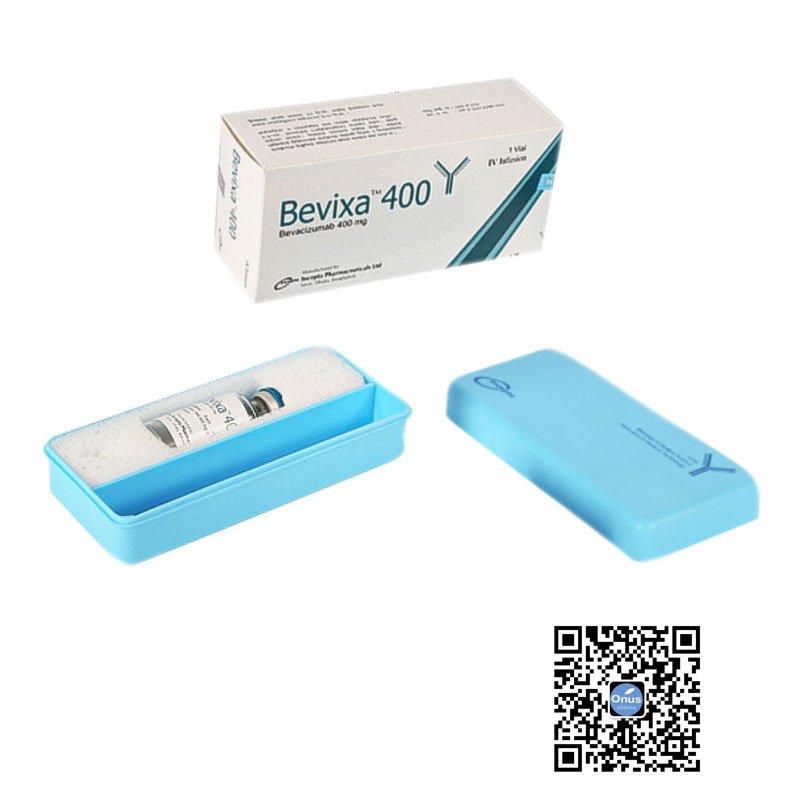Address
Road no. 4, Vatara, Notun Bazar
Dhaka, Bangladesh
Address
Road no. 4, Vatara, Notun Bazar
Dhaka, Bangladesh

Product Name: Bevixa (400mg/100mg) (16ml/4ml)
Generic: Bevacizumab
Indication: Lung cancer, kidney cancer, Fallopian tube cancer, Ovarian cancer, Glioblastoma
Bevacizumab 400 mg injection (Bevixa) is a biologic medication, known as an endothelial vascular growth factor receptor, used to treat different types of cancer. It is indicated to treat
It is in a targeted cancer therapy class.
Bevacizumab works by blocking a protein called vascular endothelial growth factor (VEGF), which helps tumors form new blood vessels. By stopping VEGF, bevacizumab cuts off the blood supply that cancer cells need to grow and spread, slowing tumor growth and helping other cancer treatments work more effectively.
Patient should continue scheduled dosing of Bevixa 400 mg injection until unacceptable toxicity and disease progression
For non-squamous non-small cell lung cancer, 15mg/kg Bevixa through injection or tube once every 3 weeks.
To treat metastatic renal cell carcinoma in combination with interferon alfa-2a, 10mg/kg through injection or tube once every 2 weeks.
To treat persistent, recurrent, or metastatic cervical cancer in combination with paclitaxel plus cisplatin or topotecan 15mg/kg into the vein once every 3 weeks.
For women with platinum-sensitive recurrent epithelial ovarian, fallopian tube, or primary peritoneal cancer, either in combination with carboplatin and paclitaxel or in combination with carboplatin and gemcitabine chemotherapy, followed by bevacizumab alone
Bevixa is indicated to treat Glioblastoma recurrent with 10mg/kg once every 2 weeks.
Adverse effects experienced by patients who have taken Bevixa 400 mg are epistaxis, headache, hypertension, rhinitis, proteinuria, taste alteration, dry skin, rectal hemorrhage, lacrimation disorder, back pain, and exfoliative dermatitis.
Based on animal studies, it was found that Bevixa can harm the fetus in the worm that’s why it is not recommended during pregnancy. Women should use proper contraception while taking this medication.
In case of lactation, it should not be administered during breastfeeding to children.
Bevixa injection can interact with medicines that affect blood clotting or wound healing, such as blood thinners and nonsteroidal anti-inflammatory drugs (NSAIDs), increasing the risk of bleeding. Using it with chemotherapy drugs may raise the chance of side effects like high blood pressure or stomach problems. Always tell your doctor about all medicines, supplements, or herbal products you take before starting bevacizumab.
Bevixa should be stored in a refrigerator at 2-8°C. Make sure it does not freeze. Keep it away from children.
The price of Bevacizumab injection depends on brand, availability, and manufacturer. The treatment cost depends on the duration, dosage, and factors related to the patient’s medical condition. The generic Bevacizumab (Bevixa) price is less than the branded one (Avastin). Your healthcare provider will choose which brand you should use.
Until your doctor suggests any special diet, follow your regular diet. Or you can ask your doctor about food interaction with Bevixa.
It stays in your body for a long time because it is slowly removed from the bloodstream. Its half-life is about 20 days, meaning it can take several months for the drug to completely leave your system after the last dose.
Life expectancy after bevacizumab varies by cancer and stage. FDA trial data report a median overall survival of about 18.3 months in metastatic colorectal cancer, while for some indications, such as breast cancer, glioblastoma, were approved based on progression-free survival, not overall survival.
Reviews
There are no reviews yet.